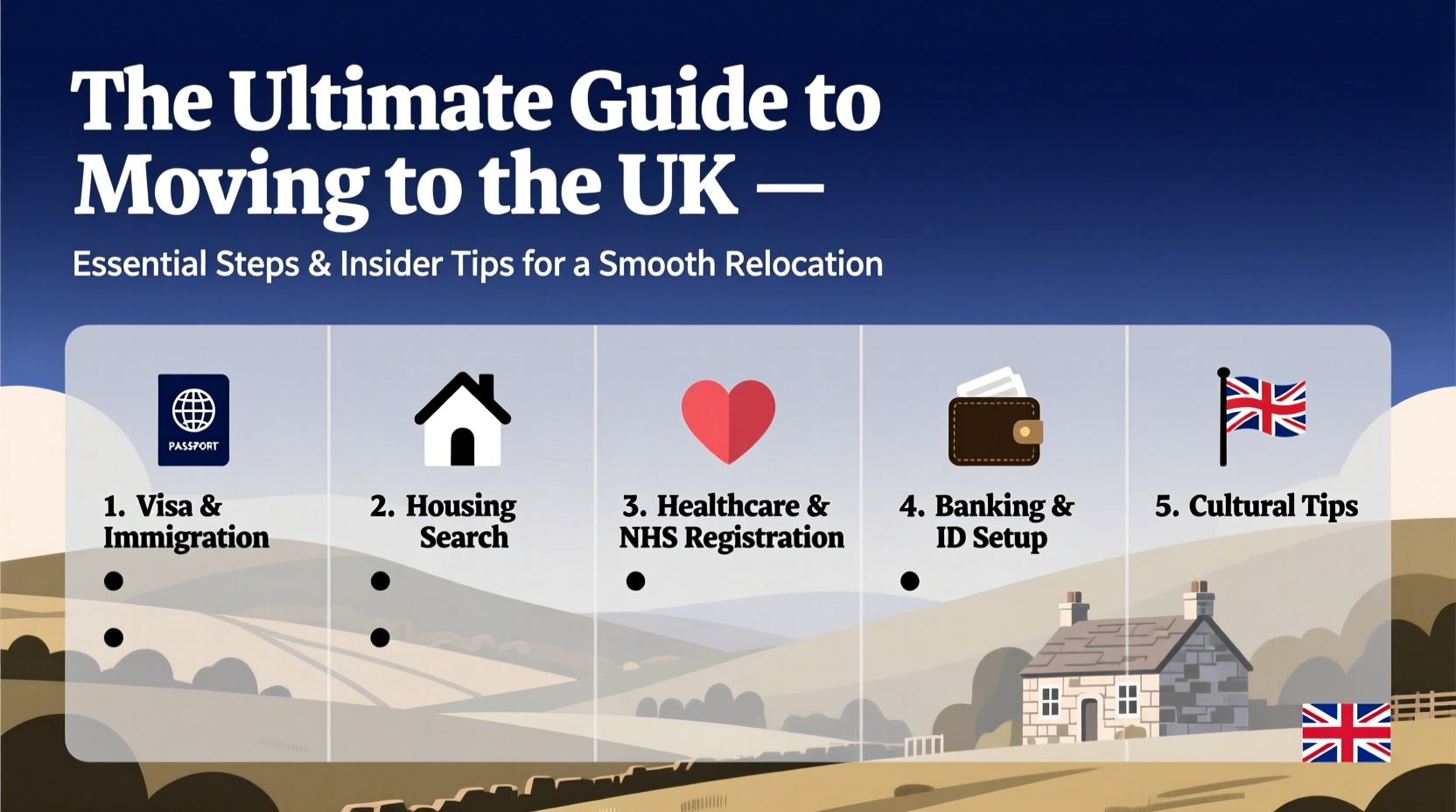Moving to the United Kingdom is a life-changing decision that attracts thousands of international professionals, students, and families every year. Whether you're relocating for work, study, or personal reasons, the process involves more than just booking a flight and packing your bags. Navigating visas, housing, healthcare, and cultural adjustment requires careful planning and insider knowledge. This comprehensive guide breaks down the essential steps, provides practical checklists, and shares real-world insights to help you transition smoothly into life in the UK.
Step 1: Understand Visa Requirements and Secure Legal Status

The first and most critical step in moving to the UK is securing the correct visa. The UK operates a points-based immigration system, meaning eligibility depends on factors like job offer, salary, qualifications, and English language proficiency.
Common visa routes include:
- Skilled Worker Visa: For individuals with a job offer from a UK employer holding a sponsor license.
- Student Visa (Tier 4): For those accepted into a recognized UK educational institution.
- Family Visa: For partners, spouses, or dependents of UK residents or citizens.
- Global Talent Visa: For leaders or potential leaders in academia, arts, or technology.
Processing times vary, but applications typically take 3–6 weeks from submission. You must also pay the Immigration Health Surcharge (IHS), which grants access to the National Health Service (NHS).
Step 2: Plan Your Budget and Financial Setup
Living costs in the UK vary significantly by region. London remains one of the most expensive cities in Europe, while cities like Manchester, Leeds, or Cardiff offer lower rental prices and overall affordability.
| City | Avg. Monthly Rent (1-bed city center) | Monthly Living Costs (excl. rent) |
|---|---|---|
| London | £2,000–£2,800 | £1,200–£1,600 |
| Manchester | £900–£1,300 | £800–£1,000 |
| Edinburgh | £1,100–£1,500 | £900–£1,100 |
Before arrival, open a UK bank account—many banks allow pre-arrival applications online. You’ll need proof of address, passport, and visa documentation. Major banks like HSBC, Barclays, and NatWest offer international relocation support.
“Setting up a UK bank account within the first two weeks helps with salary payments, rent contracts, and building credit history.” — Sarah Thompson, International Relocation Advisor
Step 3: Find Accommodation That Fits Your Needs
Housing is one of the biggest challenges for new arrivals. Most rentals require references, credit checks, and deposits equal to 4–6 weeks’ rent. Many landlords prefer tenants already resident in the UK, making it harder for newcomers.
Strategies to secure housing:
- Use reputable platforms like Rightmove, Zoopla, or OpenRent.
- Contact corporate housing providers if relocating for work.
- Consider short-term lets (Airbnb, serviced apartments) for the first 4–6 weeks while searching long-term.
- Ask your employer about temporary accommodation or housing assistance.
In London and major cities, shared flats or house shares are common among young professionals and students. Always verify the legitimacy of listings to avoid scams.
Step 4: Register with the NHS and Access Healthcare
All visa holders who pay the Immigration Health Surcharge are entitled to free healthcare through the NHS. Upon arrival, register with a General Practitioner (GP) near your residence. GP services are the gateway to specialists, prescriptions, and emergency care.
To register:
- Find a local GP surgery accepting new patients.
- Complete a registration form (GMS1) and provide ID, proof of address, and visa details.
- Wait for confirmation—this may take up to 10 working days.
Dental and optical care are not fully covered under standard NHS provisions. Consider private insurance for faster access and broader options.
Step 5: Settle In: Cultural Integration and Daily Life
Adjusting to British culture goes beyond weather and tea. Understanding social norms, public transport etiquette, and workplace expectations accelerates integration.
Key cultural observations:
- Queueing is taken seriously—always wait your turn.
- Direct confrontation is often avoided; communication tends to be indirect or polite.
- Public transport is reliable but can be expensive—consider monthly travel cards.
- Recycling rules vary by council; check local guidelines for waste disposal.
Mini Case Study: A Professional Move from Canada
James, a software engineer from Toronto, relocated to Bristol on a Skilled Worker Visa. He secured his job offer six months in advance, allowing time to apply for his visa, arrange finances, and book a short-term apartment. Using company resources, he found a permanent flat within three weeks. By registering with a GP and joining a local tech meetup group, James built both professional and social networks quickly. “Knowing what to expect made all the difference,” he says. “I arrived prepared, not overwhelmed.”
Relocation Checklist: 10 Essential Actions Before Moving
Use this checklist to stay organized during your relocation journey:
- ✅ Confirm your visa type and gather required documents (passport, job offer, financial proof).
- ✅ Pay the Immigration Health Surcharge (IHS).
- ✅ Research cost of living and set a realistic budget.
- ✅ Open a UK bank account online before arrival.
- ✅ Book temporary accommodation for the first month.
- ✅ Arrange international health insurance until NHS registration.
- ✅ Notify HMRC if you’ll be working (your employer may assist).
- ✅ Order a SIM card with UK data (available from providers like Giffgaff or Vodafone).
- ✅ Pack essential documents: birth certificate, academic transcripts, driving license.
- ✅ Join expat or community groups on Facebook or Meetup for early connections.
FAQ: Common Questions About Moving to the UK
Can I drive in the UK with my foreign license?
Yes, visitors can drive for up to 12 months using a valid foreign license. After that, you must apply for a UK license. Some countries have agreements allowing direct exchange; others require passing a UK driving test.
How long does it take to get a National Insurance Number?
It typically takes 2–6 weeks after applying. You’ll need it to work legally and pay taxes. Apply online or by calling Jobcentre Plus once you’re in the UK.
Is租房 (renting) easier with an agent or private landlord?
Estate agents offer more security and support but charge higher fees. Private landlords may be cheaper but require extra caution to avoid scams. Either way, always sign a tenancy agreement and use protected deposit schemes.
Conclusion: Start Your UK Journey with Confidence
Moving to the UK doesn’t have to be overwhelming. With the right preparation—securing your visa, organizing finances, finding safe housing, and understanding local systems—you can make the transition efficient and stress-free. The key is starting early, staying informed, and leveraging available resources. Thousands relocate to the UK each year; with careful planning, you can join them successfully.









 浙公网安备
33010002000092号
浙公网安备
33010002000092号 浙B2-20120091-4
浙B2-20120091-4
Comments
No comments yet. Why don't you start the discussion?